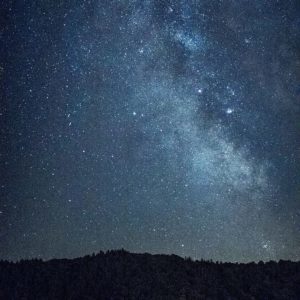 I hope we can all agree when I say
I hope we can all agree when I say
“One of the most delightful experiences is to look into the sky through a Telescope!”
To add the cherry on the top, would not it be wonderful to capture such ravishing moments? Through the use of astrophotography, we can take pictures of the astounding celestial objects, observed through the lens of a telescope. If you are looking for telescopes, here are some Best telescopes under $300!
However, the obtained images are still in need of further processing to reduce unnecessary noise that diminishes the image quality. This is done by Stacking, which adds layers of similar images and averages them to form one resultant image. Stacking of Astrophotographs can be done with the help of Stacking software that are widely available. Some are available for free while others do come at a cost.
Considering which Stacking Software to go for? Worry no more, for in this comprehensive guide we have listed down the best astrophotography stacking software. Go through the article to know which one suits you the most!
Best Stacking Softwares for Astrophotography in 2022
The table below has a compiled list of some of the Astrophotography Stacking software that is considered the perfect ones out there. In the following sections, each one of them is explained in detail.
Astrophotography Stacking Softwares
In the case of learning to stack images, here is an article on How to Stack and Process Astrophotography.
1. Sequator

Sequator is one of the free astrophotography software that is present over the internet. It is used for stacking both – Deep Sky and Starry Landscapes. Not only it is commonly used as a Stacker, but can also be used to create star trails. It is an easy-to-learn and easy-to-use software, a very intuitive one. Moreover, Sequator is a fast system, therefore causing little to no hindrance while processing the images.
However, one major drawback is that it only works with Windows. Unfortunately, it is not an astrophotography stacking software for Mac but may be used on Linux via wine+. Furthermore, it is not as advanced as some of the other software mentioned in the article. Nonetheless, it possesses the ability to reduce noise, remove light pollution, and perform other simple tasks on stacked images. It can also calibrate light frames with dark and flat calibration frames. For a free astrophotography stacking software, it surely does provide enough!
2. Starry Landscape Stacker
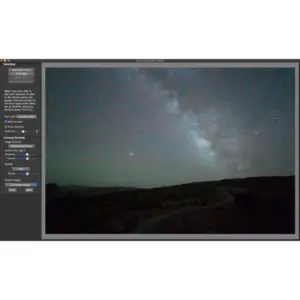
Completely opposite to Sequator in the operating system support, Starry Landscape Stacker is an astrophotography stacking software for Mac OS X. It is not a free astrophotography software but a commercial software at $39.99. However, it is also somewhat similar to the Sequator for it is also a fast and easy-to-use stacking software for astrophotography.
Starry Landscape Stacker allows you to produce Landscape photographs captured at night time. It combines several images taken in rapid succession and shifts the sky to align the stars, in order to produce Landscape images. However, there is only one downside to it that it can not process your RAW format images. Hence, the images must first be converted to the more heavy TIFF format.
The disadvantage is can be overcome by the fact that Starry Landscape Stacker gives you a good quality image and the option to save the sky only for further editing in other software. In case you are genuinely interested in Starry Landscapes then this is the one for you!
3. Adobe Photoshop
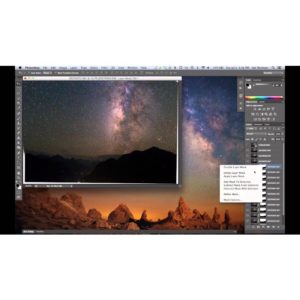
No doubt, Adobe Photoshop always ends up in the list of the best astrophotography stacking software at present. It not only works as an astrophotography stacking software only but as a Complete Image Editor. It is compatible with Windows and Mac OS X. However, it is not free astrophotography software. It is a commercial one and is available at a subscription of $9.99/month.
Compared to many, Photoshop provides many more extra features when it comes to editing astrophotographs. It consists of many light-adjusting and noise reduction tools. Even though it has these extra features, you will have to download some extra Plugins first. Moreover, it also comes in a bundle with Adobe Lightroom CC, Camera Raw, Bridge, and Web Space. There is only the issue that Photoshop lacks the ability to calibrate light frames and in order to do so, some other software will be required.
4. Deep Sky Stacker
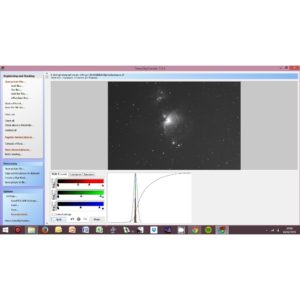
Deep Sky Stacker is considered the best stacking software for astrophotography. It is widely used to stack and calibrate images. The preprocessing steps are made easier with this software mainly due to the ability to stack all the images in one high-resolution file. The greatest part about DSS is the full calibration of images with Darks, Flats, Dark Flats, and Bias calibration frames to obtain the most suitable result possible.
It is to be noted that the DSS is believed to be the most amazing free astrophotography stacking software. Even though it lacks some noise reduction capabilities, it still has many more advanced stacking features. It is also a fast system making the user experience all the more enjoyable with its various features.
However, there are some limitations to the DSS. It is only Windows supported and therefore, not an astrophotography stacking software for Mac. Moreover, if you are looking specifically for Starry Landscapes or Planetary Astrophotography, DSS is not the right astrophotography stacking software.
5. Starry Sky Stacker
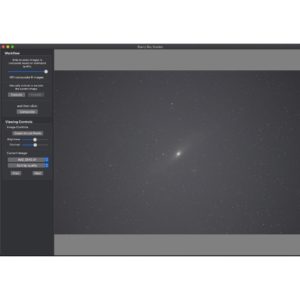
For Deep sky stacking on a Mac, Starry Sky Stacker is a good choice. It is a very basic and intuitive system to work with. The easy-to-use features and the fast processing of the system make it an ideal choice. It is a variant of the Starry Landscape Stacker for the purpose of deep-sky imaging.
The basic nature coupled with the absence of the ability to process RAW format images does not make it popular for high image editing. If you have one of the Best Mounts for Astrophotography your experience will be quite better.
6. Autostakkert!

If you are wondering about the best astrophotography stacking software especially for planetary motion, Autosatkkert! is the go-to option. It is an easy-to-use, free software, supported only by Windows. It is mostly used for Planetary, Lunar, Solar images, and for stacking full planetary disk and lunar surface close-ups.
The software is a little confusing to navigate through for a beginner, but it is relatively easy to go with the stacking steps. Although it lacks some of the features for planetary astrophotogra[hy, it is quite suitable for stacking planetary images.
7. Astro Pixel Processor
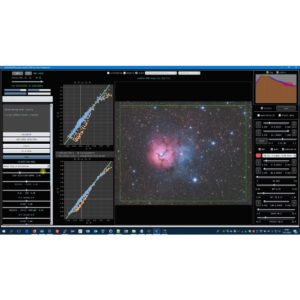
If you are in search of the best astrophotography stacking software without considering the cost of it, APP is the one!
At a subscription of $60/year on rent and $150 for an Owner’s License, it is one of the best Deep Sky Astrophotography Editors present nowadays. However, there is an added benefit of a free 30-day trial period for you to get yourself acquainted with it. Not only does it possess plenty of advanced features, but it also has compatibility with the three most commonly used operating systems – Windows, Mac OS X, and Linux. Moreover, it is rather easy to use.
Some of the advancements are in calibration, stacking, and post-processing of deep-sky images. It is, however, held back with the fact that it is only suitable for deep sky astrophotography.
8. Lynkeos
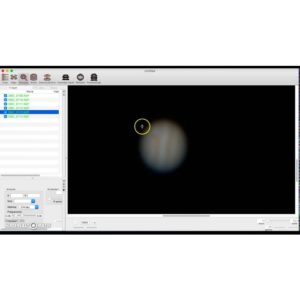
Lynkeos is the astrophotography stacking software for Mac. It is mainly for planetary stacking and is free of cost! Most importantly it is the only free planetary stacking software for Mac. Image stacking software for astrophotography for Mac users are in lesser amounts and those that are there are usually costly.
The software is quite an intuitive one but it becomes a little less easy while performing different functions. However, it has deconvolution and wavelet sharpening technology, which are necessary for Planetary Stacking.
9. PixInsight
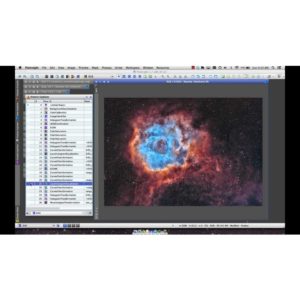
PixInsight can be considered to be the best astronomy software. It is an all-rounder Astrophotography editor and a commercial one available for $273.88. Although it is expensive software, it provides you with a lot to make it worth the price. It is inarguably the greatest stacking software for Astrophotography!
To start off, it provides a 45 days trial period to let you make yourself comfortable with it. It comes with various tutorials and information. With all those great things, it has a steep learning curve. Moreover, the user experience is a tricky one. Not only this, it requires to be run on a recent and powerful system.
10. SiriL
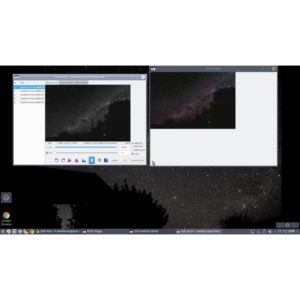
SiriL can be considered to be the best free astrophotography stacking software. Not only it has many features but it is also cross-platform. It can run on three operating systems – Windows, Mac OS X, and Linux. It is not as easy or intuitive as some of the other free software already mentioned, but it is worth the try for it has extra added features.
It helps you to develop deep sky images, calibrate, and stack astrophotography images. This image stacking software for astrophotography has the ability to produce good quality images due to the presence of many options. It also has the ability for image post-processing.
Exposure Stacking Software
Exposure Stacking Astrophotography is the term used to mean the same thing as Star Stacking. Star Stacking is simply a method of overlaying multiple night-sky exposures and then averaging them up to get an image with reduced noise.
Video
Conclusion
In this article, we have compiled the list of the best image stacking software for astrophotography. The list is quite diverse in nature for it provides you with a range of amazing astronomy software, to specific Planetary stacking, or Deep-Sky image stacking astrophotography software. Out of all those mentioned, no doubt PixInsight is the best stacking software for Astrophotography!
Stacking software for astrophotography exists many at present but not all of them fulfill the requirements completely. Most importantly, Astrophotography software for Mac is less, especially free ones, but those are worth the money and effort and mentioned in detail. Astrophotography stacking software Mac is mostly nature-specific like Starry Landscape Stacker or Starry Sky Stacker.
Photo stacking astrophotography is an art in itself, and to know about more of the stacking programs for astrophotography, here is another article for your convenience.
To capture astrophotography images, you will need a Telescope, of course! To learn how to make your own telescope, do read How To Make a Telescope With Two Convex Lenses. Moreover, you can also check out our reviews on different telescopes!
- 10 Best Monocular Telescopes UK in 2022【Reviewed】 - April 1, 2022
- How To Build A Dobsonian Telescope [Guide 2022] - March 31, 2022
- Best Astrophotography Stacking Software [Ultimate Guide] - March 31, 2022
Leave a Reply